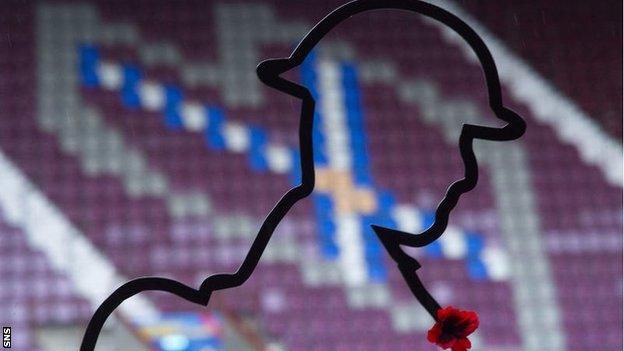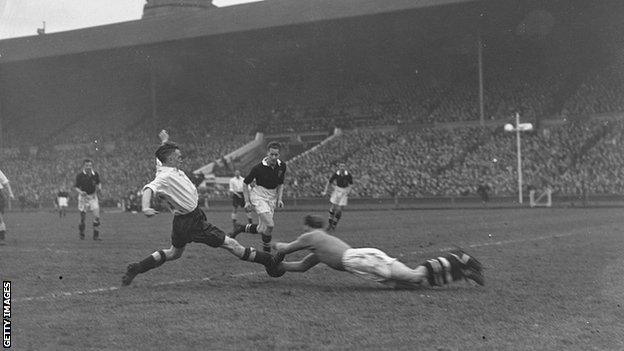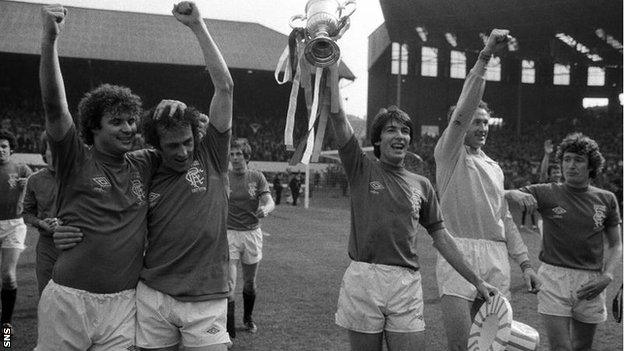Coronavirus: When else has Scottish football stopped?
- Published
Thousands of Scottish football supporters across the land are facing a very long summer.
After Dundee voted for the SPFL's plan to curtail the lower league season early, fans will have to go without their football indefinitely as the game waits for the coronavirus pandemic to ease.
However, this is not the first time the Scottish season has been interrupted.
Here, Richard McBrearty, the curator of the Scottish Football Museum at Hampden, takes BBC Scotland on a journey down the years.
1914 - World War One
When the war broke out, there was huge uncertainty. The Scottish FA didn't know what to do initially and how to react to it. There was growing clamour in the newspapers that we should not be going on as normal and that sport should be shut down.
St Johnstone actually wrote to the SFA and asked for the game to be shut down. The advice given to the Scottish FA by the War Office was to continue, but everything should be focussed towards the war effort. Fundraising and recruitment posters were issued and put up outside the ground asking young men to sign up.
It was a high profile drive with famous players signing up. The most famous is McCrae's Battalion, a lot of Hearts and Hibs players signed up.
There was disruption. The Scottish FA stopped the Scottish Cup and full international matches, but the league did continue throughout the wartime era. There was even a positive side for women's football, which had been largely divided by male-led authorities.
It was hard for clubs to get teams out on the pitch. There were disruptions to travelling and transport. You had teams arriving without enough players and they went into the crowd to make up the numbers.
Morale was an important factor, trying to keep a sense of normality with this grave thing happening. Famous footballers were fighting on the frontline and being killed or badly injured. They learnt from that in the Second World War, but there was more disruption.
There were good attendances - people were being encouraged to go to games. Some people were writing in newspapers that we should not be enjoying ourselves while people are fighting and dying for this country. But others said life has to go on and we can use it positively.

The story of the McCrae's Battalion has been told at Tynecastle
1939 - World War Two
The league does stop in 1939, after the cup and internationals. But then the clubs were saying that they were going to be absolutely skint, going to go bankrupt, meaning there was a desire to have some form of income.
Some clubs did shut down. It partly depended on where you were in Scotland and the size of the fan base. They go towards the two main leagues - the Southern League and the North Eastern League. When the NE League was set up, a lot of the teams were worried about a lack of crowds and needed a stronger showing from the South. In order to boost the league, Rangers operated two teams.
They split the league because transport was too difficult, it was impossible to get teams travelling the length of the country.
Hearts were playing Hibs in 1940 but the game was about to be called off because of heavy fog in Edinburgh, you couldn't see a thing. But because of the need to make sure that the enemy didn't know what the weather conditions were like, a commentator turned up and commentated for 90 minutes as if the game was happening. He could not see a thing, there's no match taking place, just heavy fog. But if the game was called off because of heavy fog then the Germans would have known not to send their aircraft and bomb a target.
Football players were given an option if they'd previously worked in a reserve occupation - the shipyards, the River Clyde or in coal mining, then they were given the option to go back to their previous trade and play part-time. Others were given jobs as personal trainers to help train new recruits. Tommy Walker was asked to set up an all-stars team and play close to the front line. They toured India.
But there were similar stories of getting players from the crowd to get teams filled up in Scotland.

Scotland taking on England at Wembley in 1944
1967-68 - Six-day War & foot and mouth
There was a tour that happened - it was meant to be a full international tour to Australia, Canada, New Zealand and Israel but the Six-Day War broke out.
Due to the foot and mouth outbreak, there was some degree of disruption but there's not a lot of information to say that it was anything comparable to what was happening during the war time.
The Scottish Cup was finished, the league was played to an end - it does get completed by the end of the season.
1978 - falling snow and failing floodlights
That was a series of unfortunate events. There had been industrial action, the end of the Labour government before Margaret Thatcher came into power, just going into the winter where there was really, really bad weather.
Snow storms, games getting called off because floodlights weren't working. There was a significant degree of disruption but over a relatively short period of time. It caused problems for the clubs and the organisers of the competitions but it pales in insignificance compared to what we're experiencing now with coronavirus.

Rangers defeated Aberdeen in the 1978 Scottish Cup final
1976 - European Cup Final
Bayern took on St Etienne at Hampden. A small crowd turned out due to industrial action affecting the transport. In the early 1970s as well when Dundee won the League Cup Final against Celtic they played in front of a tiny crowd. It was a big game usually, but folk couldn't get to the game.
Celtic did manage to get through to the end of the campaign and fulfil the fixtures, albeit they had a massive backlog of fixtures.
It's not just the players themselves not being able to play - the fans can't come to watch the games. We're just waiting to find out what the next steps are going to be because this is something that's going to be with us for a foreseeable period of time.
Richard McBrearty was speaking to BBC Sport Scotland's Jordan Elgott